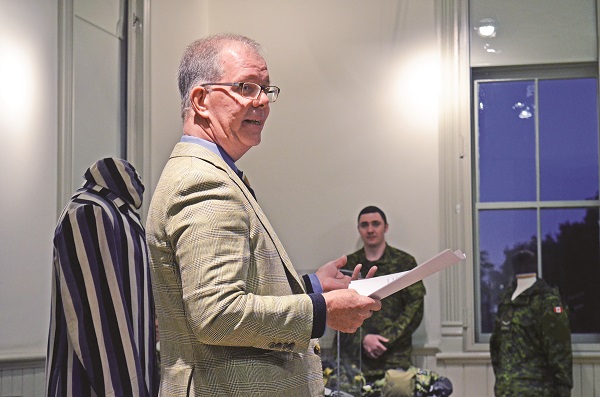General News » News
“Putting price on pollution gives money back to citizens” – Minister of Finance touts rebate program at Windfall
November 1, 2018 · 0 Comments

By Brock Weir
Putting a price on pollution will give money back to citizens, according to Federal Finance Minister Bill Morneau.
Mr. Morneau brought this message to Aurora last week on a visit to Windfall Ecology Centre at Sheppard’s Bush just hours after the Federal Government announced a new plan to tackle climate change through carbon pricing.
The Government announced that it would put in place a Federal system that would put a price on pollution in provinces that do not have an adequate carbon pricing plan, including Ontario. Dubbed the “Climate Change Incentive,” the Feds say that money received through carbon pricing will be returned to families through a rebate system. Funds will also be allocated to municipalities, schools, hospitals and other areas to help them become more energy efficient and ease emissions.
Sitting down with The Auroran after a roundtable with environmental leaders on Tuesday afternoon, Mr. Morneau said the government weighed various options on tackling climate change.
“The thing that people don’t want is pollution; the thing they do want is more money for their family. We’re giving them less pollution and more money for their family,” he said. “The thing that we have to help people understand is that putting a price on pollution, which does raise the cost on things, [we’re] making sure we give the money back to families and those two things are actually working in a way to actually have a big long-term impact. The example that is clearest in Canada is British Columbia put a price on pollution. They also decided to lower people’s taxes…as a result. What we have seen there is a model that works: they have reduced pollution and they have ended up with a really strong economy and lowered people’s taxes.
“In our situation, it is even more straightforward: we’re putting a price on pollution and we have done the model to know that we’re actually going to give people more back on the average than they would have spent on that. That’s the challenge that we set ourselves up to achieve and I think we have done that.”
When the Prime Minister and Finance Minister announced the rebate program last week at Toronto’s Humber College, a rebate program which will take effect next April, both were grilled on whether or not this was “vote-buying” ahead of the 2019 Federal Election, and/or a direct rebuke to Premier Doug Ford who has made getting out of carbon taxation a primary plank of his mandate.
Mr. Morneau said the timing of the plan was made to coincide with tax season and for no other reason that that.
“The most efficient way for us to manage this is to do it through the tax system, so you will get a line on your tax system that you answer a question and if you’re a typical family in Ontario, you’ll get $307 more through the system,” he said. “Since we’re doing it through the tax system, we’re starting the increase at the same time so no one is out of pocket. You get the money and then the price on pollution will start. That’s the key driver. We think people in Ontario will see there is a long-term advantage for the environment and there is an advantage for the family that they are getting money.”
Other models were considered before landing on the rebate option, he added. 197 other countries signed on to the Paris Accord recognizing the impact of Climate Change was “going to be disastrous now for this generation and certainly for the next generation,” he continued.
“The targets we put in place in order to achieve those, we had to look at the way it was going to be most economically efficient,” said Mr. Morneau. “We looked at different ways that we might be abler to have a big economy-wide impact and realised that putting a price on pollution was the biggest and most important impact. The way I think about it is it was only a generation ago that we had people pumping effluent into rivers and lakes to realise that wasn’t okay, and we forced business to either not do that or pay for the cleanup. What we’re doing here is really similar: we have to price pollution and that is the way it is going to have the biggest impact. It will start changing behaviours, it will start encouraging businesses to think about how much they should invest in technology changes, for example, that can actually have an impact on the businesses’ level of carbon emissions, and it will allow people, by getting back the money, to [have] their own choice on how they spend that money.
“Of course, if they are in a situation where they live in a rural area and they don’t have any alternatives, then they’re going to continue using that money in order to buy their gasoline, and that’s okay because they’re going to be no worse off. But, if they’re in an area where they can potentially switch to something else, they might – or maybe they can switch every once in a while. With the $307, [if] they decide they want to look at something they can do to reduce their energy usage in their house, that’s great, but in some cases, they’re going to decide to use it for their kid’s math lessons or hockey equipment. That’s everybody’s individual choice. In the end, the price decision will make the biggest difference.”











